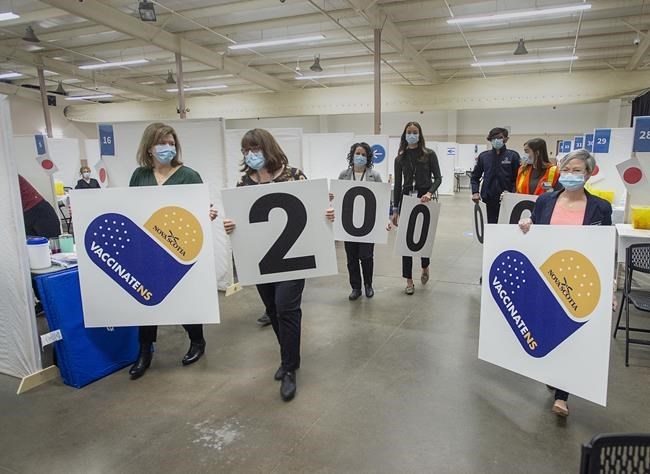HALIFAX — As Nova Scotia begins emerging from its COVID-19 lockdown, a group of hotels in the Halifax area is appealing to the government for more clarity about when they can expect guests to return.
In a letter sent to Premier Iain Rankin on Tuesday, the Hotel Association of Nova Scotia said its 25 members need clear targets for a reopening of the province's border so tourists and business travellers can make plans.
Association president Megan Delaney said that while hotels realize health concerns are the overwhelming priority for the government, they would like "dates with flexibility" outlining when normal travel into the province can resume.
"What we are looking for are dates so people can start thinking about their upcoming months and their summer plans," Delaney said in an interview. She said hotels will have a hard time surviving through the summer without tourists from outside the province.
Delaney, who is general manager of a downtown Halifax hotel, said her property and others have been getting customer inquiries since the province announced a five-phase reopening plan last Friday. But because the plan contains no target dates, it's difficult for people to book.
"What we are having right now is either hesitancy to come, so they are just not booking yet, or people are sadly choosing alternate destinations," she said.
Currently non-essential travel is restricted from most of Canada. People travelling between Nova Scotia, New Brunswick and Prince Edward Island need to self-isolate when they arrive in Nova Scotia and they also need to apply to travel to the province by completing a safe check-in form.
Delaney said that without target dates for the loosening of those restrictions, it's hard for hotels to make preparations such as calling back laid-off staff. She said her hotel usually employs over 80 people during the peak summer months but is operating with a staff of fewer than 30.
The first step of the province's reopening plan takes effect Wednesday, with schools reopening, retail stores allowed to operate at 25 per cent capacity and restaurant patios reopening at full capacity with physical distance between tables.
The plan is contingent on the province's number of infections, its vaccine rollout and the capacity of its health-care system to manage new COVID-19 cases.
During a press briefing on Monday, Dr. Robert Strang, the province's chief medical officer of health, said the steady decline in infections means the reopening plan will likely advance in two-week intervals instead of up to four weeks, as initially projected.
"Which means we could be in Phase 4 by the middle of July, which is where we would stay for the rest of the summer," said Strang.
The fourth phase would allow people from the Atlantic provinces to travel to Nova Scotia and travellers from the rest of Canada would be allowed to enter under a modified quarantine that wouldn't require 14 days, he said.
Darlene Grant Fiander, president of the Tourism Industry Association of Nova Scotia, said there are signs the government can adapt quickly as case counts drop. She pointed to a move made Monday to reopen schools and remove travel restrictions in Halifax and Sydney, N.S., just three days after the measures were originally left in place as part of the first phase.
"We do anticipate that the timeline of the two weeks will be modified as things progress," Grant Fiander said in an interview.
However, she said tourism operators would like to see more coordination between the Atlantic provinces on when they plan to reopen their boundaries to travellers.
Prince Edward Island is looking to welcome Atlantic Canadian travellers who have had one dose of vaccine June 27 and other Canadians who are fully vaccinated on Aug. 8. New Brunswick is dropping its self-isolation requirement for Atlantic Canadians on July 1 and is hoping to open to other Canadians on the same day and to travellers from Maine later in July.
Nova Scotia reported 12 new cases of COVID-19 on Tuesday. There are 369 known active cases of novel coronavirus with 38 people in hospital, including 15 in intensive care.
This report by The Canadian Press was first published June 1, 2021.
Keith Doucette, The Canadian Press

